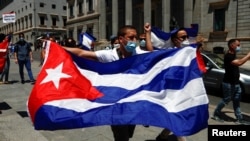Grabbed off the street by police, Camila Acosta was taken to a Havana police station where officers ordered her to undress.
The journalist, who works for the Spanish newspaper ABC and for Cubanet, an independent online news site, was told by two women at the station that if she refused, they would force Acosta to remove her clothes.
"On two occasions she (was) forced to undress, the first of which was the most aggressive and humiliating," according to a report published Tuesday.
Acosta's case is one among 181 in the report "Torture in Cuba," compiled by Prisoners Defenders, a Cuban independent group based in Madrid.
The report deals with a small portion of the 1,277 political dissidents, including journalists, but also taxi drivers or other people who, the group says, are behind bars because they oppose the Cuban government.
The findings are based on statements provided via networks of family, friends, and legal representatives, and then verified by Prisoners Defenders.
Javier Larrondo, president of Prisoners Defenders, said his organization wanted to go beyond the statistics to provide the West with a clear picture of how Cuba treats dissent.
"We must focus on whether political prisoners are treated decently or if they are tortured, and in Cuba this report shows that everyone is tortured," he told VOA.
Cuba's International Press Center — the government agency that handles media inquiries in Havana — did not reply to VOA's email requests for comment.
Arrested after covering protests
In Acosta's case, she was arrested after covering demonstrations in July 2021, the largest protests against the communist government since former leader Fidel Castro's revolution.
She was placed under house arrest after refusing to sign a document saying she was guilty of public disorder.
At that time, Cuba detained and questioned dozens of journalists over their coverage of the protest movement.
Hundreds of Cubans remain in jail nearly two years later.
Human rights groups, the EU, and the United States criticized Cuba's response to the protests as heavy-handed and repressive.
The Cuban government said those jailed were guilty of assault, vandalism and sedition.
In its report, Prisoners Defenders found torture is routinely used.
"Acts constituting torture and other cruel, inhuman, or degrading treatment or punishment are a further reflection of the repression that is exercised, among other reasons, toward political dissidence in Cuba," the report said.
These methods are also "a means of obtaining confessions, fabricated and false, with the aim of keeping activists in prison for long long periods of time."
The report said that the pattern of mistreatment is "a license granted by the regime" to aggressive or unstable elements within the police and military "who do not hesitate to mistreat, humiliate, and torture human rights activists, homosexuals, transsexuals, and their families."
The report said that some guards refrained from torturing inmates because they objected on conscientious grounds.
Inmates subjected to extremes
A litany of techniques was used against the victims, the report said.
Prisoners were deprived of medical care or made to do forced labor. Others were forced to adopt uncomfortable or degrading physical positions, the group alleged.
Some were allegedly subjected to prolonged periods of solitary confinement or forced to bear extreme heat or cold.
Physical aggression or being taken to unfamiliar locations were among other techniques used in prisons, as was spreading uncertainty about the fate of relatives.
Others said they were denied food, liquids or even sleep for long periods, the report claimed. In some cases, prisoners were prevented from any contact with family or lawyers.
Physical threats or intimidation with instruments of torture also were documented.
Journalist convicted of 'resistance'
Among the 181 cases analyzed are two journalists: Acosta and Lazaro Yuri Valle Roca, a freelance journalist.
Valle Roca was arrested in June 2021. He was convicted and sentenced to five years in prison in July 2022 for the offenses of "resistance" and "enemy propaganda."
In prison, Valle Roca complained to his lawyer that he had been fed rotten food. He has been suffering from a sustained case of flu for the past six months, Prisoners Defenders said.
The report will be presented to the United Nations Committee Against Torture, the Cuban government, and rights groups including Human Rights Watch and Amnesty International.
"All these forms of torture are applied in a generalized and systematic way, without any limitation, except [we intuit] with cases of conscious objection of some commanders of guards who do not act in the same way as others," the report said.
Prisoners Defenders said respondents were invited to offer their statements and to fill in a questionnaire. The responses were checked with other sources and the identities of the respondents were verified.
Larrondo of Prisoners Defenders said the report did not specifically analyze the number of journalists allegedly mistreated by the Cuban authorities.
"We have not obtained these statistics, but the majority [of cases] are civilians with no ties to the opposition or dissidents. [They are] ordinary Cuban families," Larrondo added.
The European Union announced last week that a special human rights envoy will be sent to Cuba this year to discuss the aftermath of the anti-government protests in July 2021, Reuters reported. However, the EU's top diplomat said it would not "impose" demands on the communist-run Caribbean nation.
Editor's note: The 10th paragraph of this article has been updated to correct the month that protests took place.





